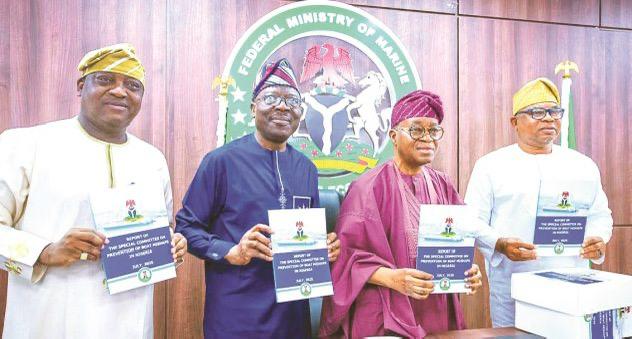
In a major step towards ending recurring boat mishaps on Nigeria’s waterways, the Minister of Marine and Blue Economy, Adegboyega Oyetola, at the weekend received a comprehensive report from the Special Committee on the Prevention of Boat Accidents. The report was submitted in Abuja and is expected to serve as a blueprint for sweeping reforms in the maritime transport sector.
Present at the event were the Chairman of the Committee and Managing Director of the National Inland Waterways Authority (NIWA), Mr. Bola Oyebamiji; the Permanent Secretary of the Ministry, Mr. Olufemi Oloruntola; and the Director of Maritime Safety and Security, Mr. Babatunde Bombata.
Addressing stakeholders during the submission, Oyetola reaffirmed the Federal Government’s commitment to making Nigeria’s waters safer, stating that the spate of accidents is “unacceptable and preventable.” He emphasized that maritime safety is both a policy obligation and a moral imperative.
“The safety of our citizens on water is not just a policy responsibility; it is a moral duty. Every life lost in a boat mishap is one too many,” Oyetola said.
The minister highlighted several key government interventions, including the nationwide distribution of life jackets to riverine and coastal communities, the planned phase-out of substandard boats, and stronger enforcement of safety standards. He stressed that the use of life jackets must become habitual among water transport users, calling it a non-negotiable safety measure.
Oyetola further called on state governments to support the federal initiatives, warning that the campaign to stop boat mishaps cannot succeed in isolation.
“We call on state governments to collaborate with us in enforcing standards and saving lives,” he appealed.
The Special Committee, inaugurated on February 27, was tasked with conducting a comprehensive review of boat operations, identifying accident causes, and proposing long-term solutions. The 16-member committee—made up of experts in maritime safety, engineering, and waterway operations—submitted a six-chapter report that outlines the current challenges, regulatory gaps, and recommendations for sustainable reform.
Committee Chairman, Bola Oyebamiji, noted that the committee extended beyond its initial six-week timeline to ensure credibility and depth in its findings. Among the 64 recommendations presented, 17 were highlighted as priority action points. These include:
- Establishment of a Coastal Guard to enforce safety rules;
- Introduction of a National Boat Design Policy;
- Mandatory certification and formal training for boat operators;
- Strategic funding increase for NIWA’s hydrographic and marine engineering units;
- Creation of search and rescue stations across critical waterways.
“We created four technical sub-committees and held both physical and virtual meetings to ensure a robust and practical report. We hope our recommendations will shape lasting safety frameworks,” Oyebamiji said.
The report’s submission is expected to mark a turning point in the Tinubu administration’s “Renewed Hope Agenda,” with a strong focus on safe and sustainable marine practices.
Members of the committee include Dr. Dayo Moberuola, Prof. S. Abiodun, Dr. Babatunde Olaosebikan, Prof. Busayo Fakinlede, Hadiza Idris Kuta, Engr. Yahaya Farouk, Attahiru Maccido, Denis Tar Iyaghigba, Gani Tarzan Balogun, Capt. Stan Chucka Igwe, Raiph Onoshakpor, Prof. Ibiba Douglas, Richard Ntan, Babatope Fajemirokun, and Ofie Adams.
